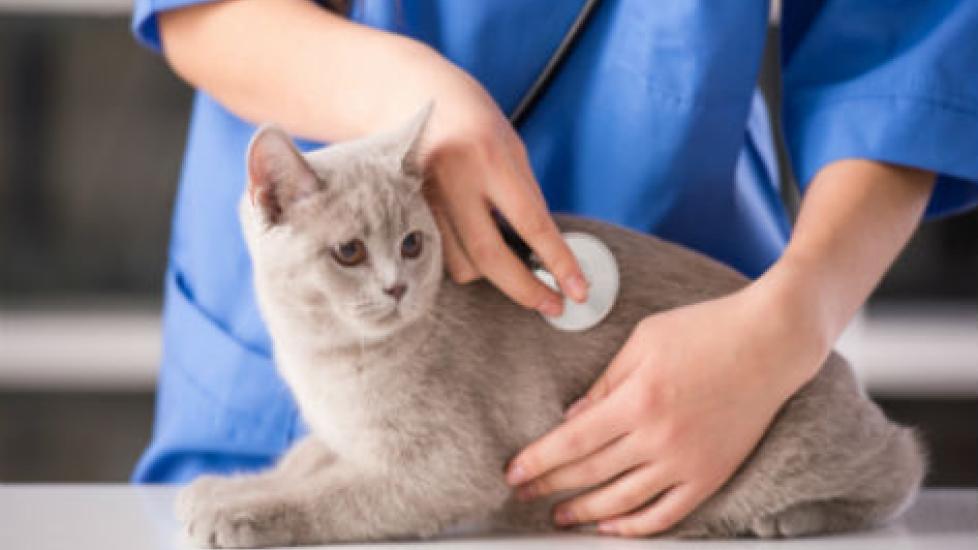How to Treat Feline Immunodeficiency Virus (FIV)
By Dr. Jennifer Coates, DVM
If your veterinarian has tentatively diagnosed your cat with FIV based on a screening test, this is what you can expect to happen next.
- Medications: Anti-viral drugs (e.g., AZT) can help some cats with FIV, but treatment is usually limited to supportive care and dealing with secondary health concerns as they arise.
- Diet: Good nutrition is essential to maintaining optimal immune function in FIV positive cats.
What to Expect at the Vet’s Office
- Confirmatory testing should be run on every apparently healthy cat that tests positive for FIV. A Western Blot test is a good confirmatory test unless the cat has been vaccinated against FIV, in which case a Polymerase Chain Reaction test is a better choice.
- Your veterinarian may also recommend additional diagnostic tests like a complete blood cell count (CBC), blood chemistry panel, and a urinalysis to get a better picture of your cat’s overall health and to plan appropriate treatment.
Zidovudine (AZT) and other antiviral medications have been used to treat some cats suffering from the effects of FIV infection. These drugs can reduce a cat’s viral load, but the side effects of treatment may outweigh the benefits. Veterinarians have also used interferon on cats exhibiting symptoms associated with FIV, but the benefits of this drug are questionable.
Erythropoietin can be prescribed to raise the red blood cell count of an FIV positive cat suffering from anemia.
Secondary bacterial and fungal infections are a common problem in cats with FIV. The appropriate use of antibiotics and antifungal medications can often improve a cat’s condition for a period of time. When a cat’s quality of life declines to an unacceptable level, euthanasia or hospice care is the best option.
What to Expect at Home
Many cats who test positive for FIV but are not exhibiting any symptoms of the disease can live happily for years after their diagnosis. These individuals should eat a highly nutritious diet to promote good immune function and be kept indoors to limit their exposure to infectious diseases and reduce the chances that they could spread FIV to other cats. FIV positive cats should have a physical examination, complete blood cell count, blood chemistry panel, and urinalysis performed by a veterinarian once or twice a year so any problems that do develop can be caught and addressed early.
Questions to Ask Your Vet
False positive results on FIV tests are real problem. A positive result in an apparently healthy cat should always be confirmed by at least one other type of test. Cats who have been vaccinated against FIV will test positive on screening tests and Western Blot tests. Cats under the age of six months will sometimes erroneously test positive on FIV screening tests because they have maternal antibodies against the disease in their bloodstream. If you have any doubts as to your cat’s diagnosis, ask your veterinarian to show you the results of at least two different types of FIV tests and explain why he or she has reached the conclusion that your cat does indeed have FIV.
FIV is not a highly contagious disease, but it can be passed from cat to cat, primarily through bite wounds. There is also a small risk of disease transmission associated with sharing food bowls, mutual grooming, and other activities that could expose an uninfected cat to an infected cat’s saliva. If you live in a multiple-cat household, have all your cats tested for FIV and ask your veterinarian whether you should vaccinate your FIV-negative cats against the disease.
Possible Complications to Watch For
Talk to your veterinarian if you have any questions or concerns about your cat’s condition.
- Cats who take antibiotics can develop loss of appetite, vomiting, and diarrhea.
- Antiviral medications can cause bone marrow suppression. Cats on antiviral drugs should have a complete blood cell count (CBC) checked frequently.
- Symptoms of a worsening FIV infection vary but often include oral inflammation, lethargy, loss of appetite, weight loss, vomiting, diarrhea, and neurologic disorders. Call your veterinarian immediately if you notice any change for the worse in your FIV positive cat.
More to Explore
Why FIV is Not a Death Sentence for Cats
FELV – Similar But Not Identical to FIV
An Impassioned Defense for the Adoption of FIV-Positive Cats
Image: VGstockstudio / via Shutterstock
